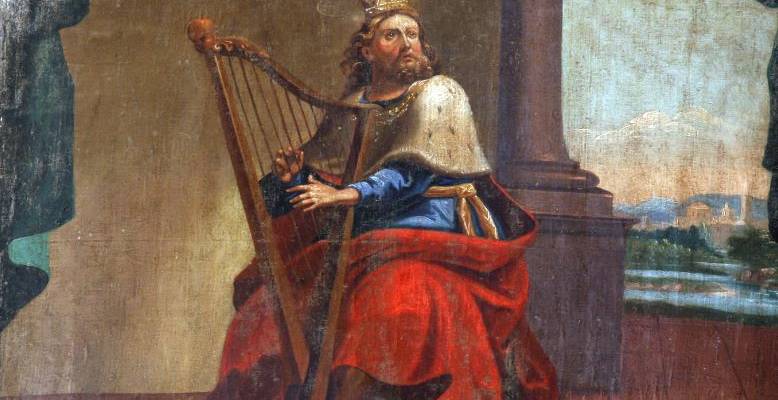A recently read Torah portion (Deuteronomy 16:18-21:9) deals with kings and monarchy in Judaism. As such, it is a good opportunity to review the life of the most famous king of Israel, David.
By Rabbi Ari Enkin, Rabbinic Director, United with Israel
King David was born in Bethlehem in about 900 BCE. According to some accounts, David was the youngest of seven boys, while other sources say that he was the youngest of eight. We are unsure who is mother was, but his father was Jesse, grandson of Ruth, the famous Moabite convert. There is reason to believe that he was a redhead, though it is impossible to be sure.
As is the case with all Kings of Israel, David was also a descendant of Judah, one of the fathers of the Twelve Tribes. Indeed, a Jewish king, including the Messiah, must be a descendant of Judah
David comes on to the scene as a young shepherd boy, looking after his father’s sheep. At the time, Saul was the King of Israel. Saul, however, disobeyed God’s command to wipe out the Amalekites, and therefore the monarchy was taken from him. God told Samuel the Prophet to anoint and prepare David to become the King of Israel.
Saul and David had a very turbulent relationship, to say the least. They first met when Saul, suffering from a bout of depression, was advised to seek a musician to play music for him, which is known to be therapeutic. David was chosen to play for Saul, who had no idea that his musician had been anointed and would be his successor.
Also, at about this time, the Jewish people were at war with the Philistines. One such battle took place in the Elah Valley, a few minutes’ drive from my home in Beit Shemesh. The Jews were on one side of the field and the Philistines on the other side. However, instead of the expected all-out battle, a Philistine leader, a giant named Goliath, came out with a proposal. He suggested that instead of both nations going out to battle, the Israelites could choose one of their people to take him on, one on one. The loser and his nation would be slaves to the nation of the winner.
No Jew wanted to take on Goliath, who continued to make his offer every day for 40 days. Eventually, young David came forward. Armed with a slingshot and five stones, he accepted Goliath’s challenge. As Goliath was laughing, David managed to sling a stone right between the giant’s eyes, killing him on the spot. David cut off Goliath’s head as a gift to Saul. The Philistines retreated in fear, and that was the end of them for awhile.
Saul’s jealousy of David only grew, and Saul made several unsuccessful attempts to kill David. When David had the opportunity to kill but didn’t, Saul realized that David was not his enemy. From that time on, Saul ceased trying to kill David.
After the death of Saul, David became King of Israel as planned, making Hebron his capital. He maintained an army of close to 300,000 men and waged a number of successful wars, silencing our enemies for years.
David and Batsheva
King David had eight wives: Michal, Ahinoam, Avigayil, Maacah, Haggit, Avital, Eglah and Batsheva. Not much is known about most of his wives. Michal was a daughter of King Saul, who was given to David in marriage as a rewarded for killing Goliath. Abigail, described as a wise and beautiful woman, was the widow of Nabal. The most famous wife, of course, was Batsheva.
One day, David went out to his rooftop and saw Batsheva, a beautiful woman, bathing. After seeing her and desiring her, the king had her summoned to appear before him. He asked her who she was, and she told him that she was the daughter of Eliam and wife of Uriah, one of David’s finest warriors. David had relations with the married Batsheva and sent her home. Batsheva later notified David that she was pregnant from the encounter. David wanted Uriah to leave his post in the army and return home to be intimate with Batsheva so that his sin would be hidden.
However, upon returning home from the army, Uriah did not actually return home! He remained in the palace with David and his guards. This continued for several days. David couldn’t get Uriah to return home.
Once David realized that his plan to hide Bathsheba’s pregnancy from him wasn’t working, he came up with a new plan. David had Uriah placed on the front lines in an arrangement that was certain to see him die in battle. David then married Batsheva.
God was angry at David for his sin and sent the prophet Nathan to rebuke the king. Although David repented, he was punished for his sin by having the child born from the adulterous encounter die shortly after birth. Their next son, Solomon, became King of Israel after David.
REBUILD ISRAELI FARMS DESTROYED BY HAMAS - PLANT TREES!
ISRAELI FARMERS DESPERATELY NEED YOUR YOUR HELP
Hamas tried to destroy everything. Terrorists murdered 1200 innocent Israelis. Join us in planting 12,000 trees of life to honor the victims. Send blessing to the People and Land of Israel.
“…I will ordain My blessing for you…” (Leviticus 25:4,21)
JOIN OUR CAMPAIGN TO PLANT 12,000 NEW FRUIT TREES ACROSS THE LAND OF ISRAEL!




